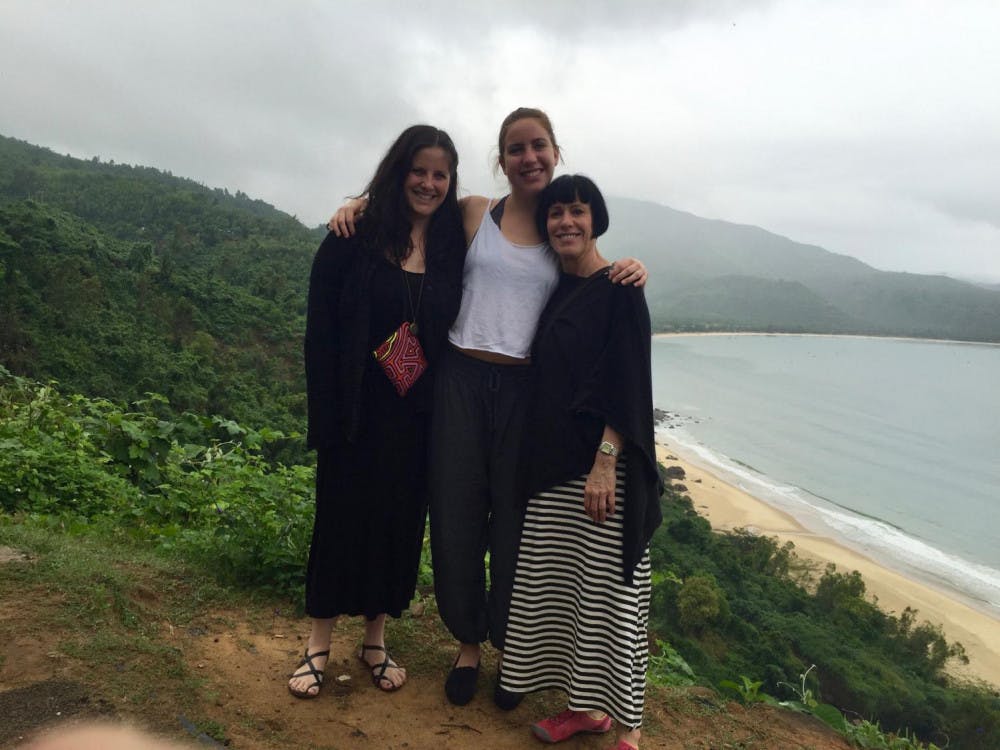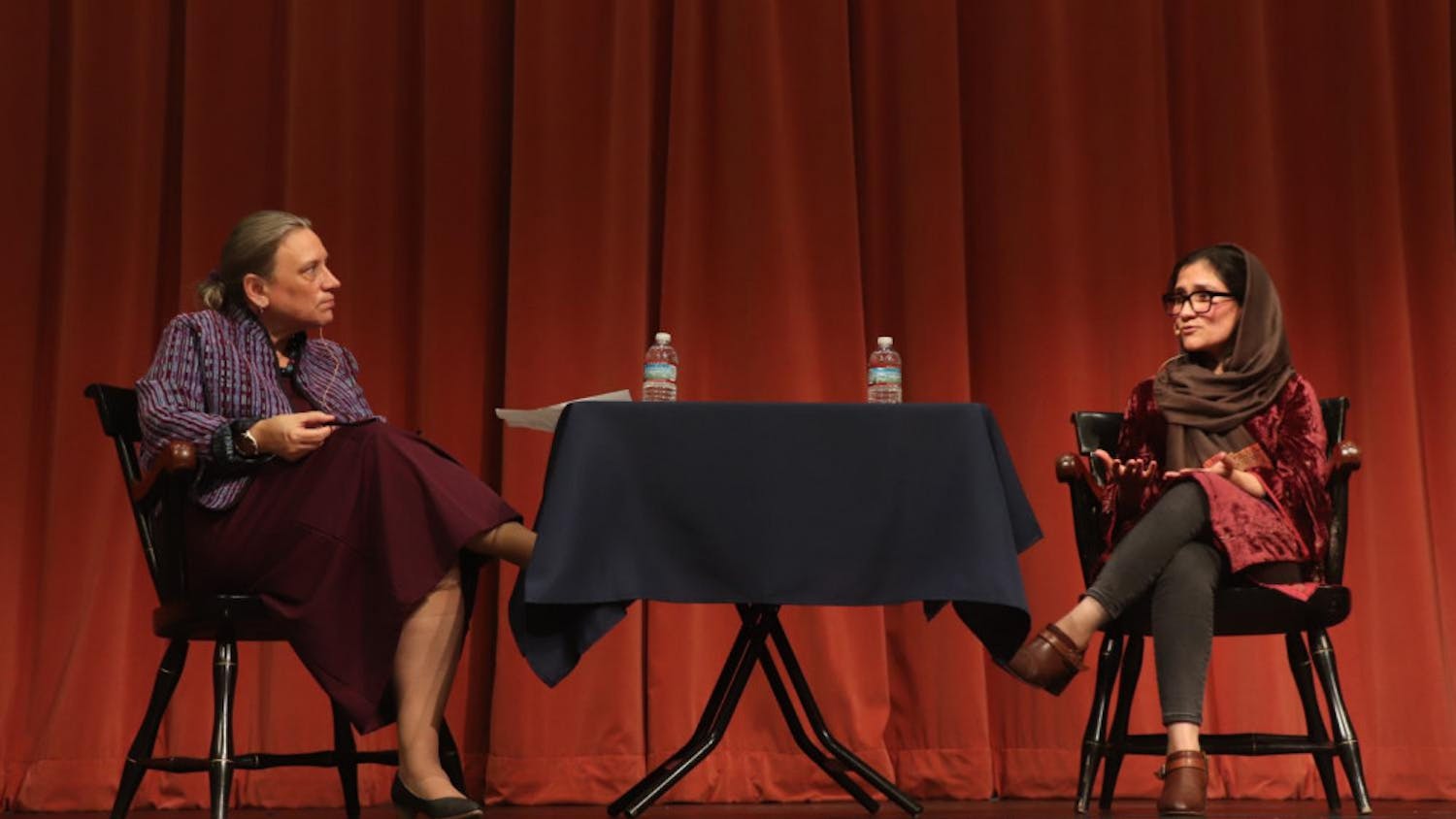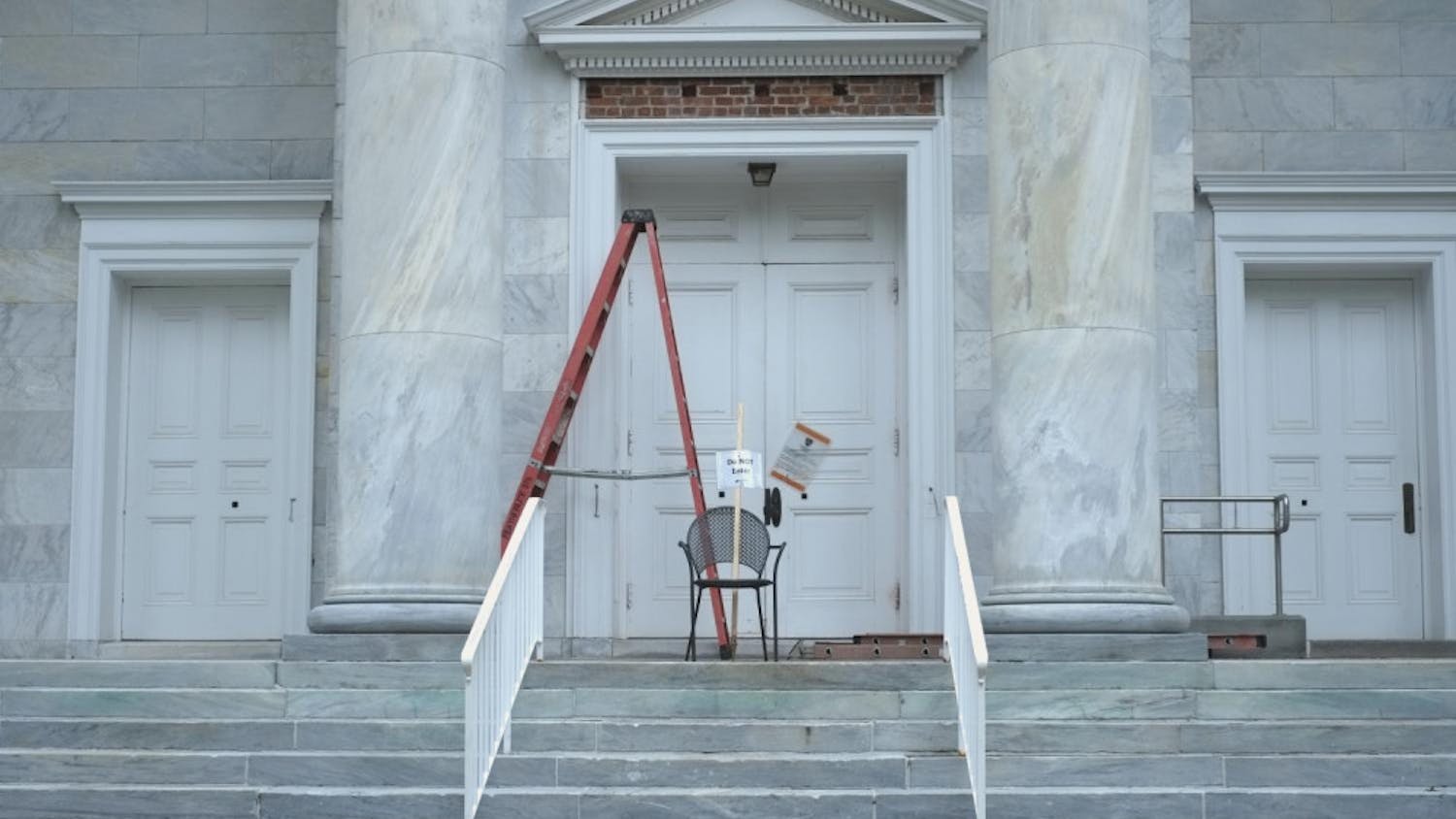On a sunny Saturday afternoon, a group gathered inside Mead Chapel to celebrate the life of Juana Gamero de Coca, a Spanish professor, who passed away suddenly on Oct. 6. The room was full of photographs and colorful flowers that the attendees brought with them and placed in vases. Juana’s family and friends spoke in three languages about a woman full of love, life, and passion. To celebrate Juana, The Campus has gathered excerpts of those eulogies and statements from Juana’s students, published with permission. Some of the passages have been edited for length.
I used to always complain that you weren’t a normal mom. You wore a lot of black. You never once made me chocolate chip cookies. Or meatloaf. You always kissed me a lot. And I mean a lot. On my cheeks. My arm. You really liked to kiss my knee. You had an accent that made it sound like you were saying “bitch” instead of “beach”. The first time you took me on a vacation, you chose Peru instead of the Florida Keys. You didn’t live in a big home, with a picket fence and a photogenic dog. You smoked cigarettes. You cried a lot. You laughed a lot. You yelled a lot. You weren’t the mom that hid your feelings from your kids. Or pretended that because you were a mom you had life figured out. You told Carmen and I to feel the weight of this world. To let our emotions in and let them blanket us from all sides. You never told us to pick ourselves up. We were allowed to feel the comfort of staying fallen. To take a break from the exhausting demands of being eye-level with everyone else.
Why can’t you just be normal? I used to say. Why do you always have to embarrass me? I would say. Now, what I long to say most is that I loved the way you were. I understand that this world weighed down on you. It was hard on your body. Tough on your heart. I don’t blame you for leaving so early. For wanting to escape Trump America and leave while Cataluña is still a part of Spain. The last few years, I met you in a new capacity. You opened up to me about your heartaches and troubles. You showed me what happens behind your bold red lipstick. That there are times when you feel fragile, too. Sometimes when you woke up in the morning, you would ask me if I thought you were pretty. When your relationship was stung by conflict, you lay paralyzed for days. When your sickness took you to different hospital beds, you asked to borrow my hand to be fed. And when you realized life isn’t always as happy as in the books, you asked Carmen and I to be happy for you. It was hard for my self-absorbed college student self to understand the gift of being able to take care of my mother. I’m sorry I didn’t offer more, but thank you for letting me in.
I stay up now thinking about the stories I never heard. About the memories that never had the chance to become memories. But just like you used to say to me. We are more than the same blood and bone. We are mother and daughter. Carmen and I will carry on for you. We will travel the world, go to India, have your grandchildren, and fall in love.
The last time I talked to you was the night that you passed away. I told you I was having a sad day. I had broken up with my boyfriend and I felt lonely. You called me and again, for the millionth time, told me that it was okay to feel sad. You said that hard things happen and I shouldn’t expect to get over them. Instead, sometimes you just have to leave sadness in a little pocket nearby. Life will carry on but the sadness will stay to help you remember and to help you grow. I’ve put you in a brand new pocket that I made out of silk and cashmere. You’ll stay there forever. And I’ll never mix you up because you were not a normal mom. You were special. And as my sister already said, you are the most beautiful woman we will ever meet.
by Izzy Fleming ’17, Juana’s Daughter
...
Mi mama era la mujer mas hermosa que conocí en toda mi vida. Y no lo digo por como se veía físicamente porque eso es obvio. Lo digo por su forma de pensar, su manera de bailar, su pasión para la justicia y la importancia que daba en asegurar que todos los demás estaban bien. Ella lucho mucho con ella misma durante su vida y creo que eso la hizo querer mas para los demás que para ella.
She taught Izzy and I to be aware of the world and what was happening to people everywhere. She taught us to be proud of being different. She taught us to speak our minds. And she was successful, because she taught me to really, really speak my mind, which meant that when I grew up we had similar ways of arguing and discussing issues. When we discussed issues of social justice and politics we would start calmly and then without fail begin to yell at each other for 10 minutes until we realized we were agreeing with each other and just saying the same thing in different words. We used to scare my sister Izzy and my friends because they would think we were fighting but really she just taught me to be passionate like her about what I believed.
When my mom came to the U.S. her father told her that he had lost her and she would never go back. She told him he was crazy and that she was just going to work as a nanny and take English classes and would be back soon. She met my father and everything about her life changed and her father was right, she stayed.
The other day our dad said that he was always so impressed and so proud of her for what she accomplished, coming to the US without speaking English and making it to where she did. Izzy and I are so lucky that we had our mother and father as parents, who unlike other divorced parents always truly cared so deeply for each other that we all remained a very close knit family.
Mi mama fue alguien con quien todo el mundo se enamoraba con solo conocerla. Hizo sentir a todos que eran importantes y felices. En su presencia todos se reían y bailaban y reían y bailaban. Creo que mi mama es la persona mas hermosa que todos aquí hemos conocido y somos todos mas hermosas con solo haberla conocido.
My mom was someone that everyone fell in love with after meeting her. She made everyone feel important and happy. In her company everyone laughed and danced and laughed and danced. I think my mom is the most beautiful person that everyone here has ever met and we are all more beautiful just from having met her.
by Carmen Fleming ’10, Juana’s Daughter
...
Lo que viví toda esta semana no tiene nombre ni palabras. Por eso fue tan difícil tejer el manto delgadisimo y frágil que quise venir a compartir hoy con todos porque a todos nosotros pertenece. La red de protección que es el amor de los otros por mí, por ti, por ustedes, por ellos, hasta convertírsenos en amor de nosotros por nosotros.
Gracias de todo corazón... Roto.
Finalmente para dar remate a la más tierna ceremonia que los vivos pueden hacer por los muertos - recordarlos que significa literalmente “volverlos a pasar por el corazón”- subieron Isabel y Carmen, la verdadera sangre viva de Juana, su verdadera mirada y su verdadera sonrisa hecha dos seres humanos. Subieron a decirnos con muchas historias y pocas palabras que son ella, que ellas son su madre - la más amada, la más admirada, la mejor del mundo- y que en ellas perdura nuestra Janita, aquella bendecida por todos los dones y todas las virtudes que hoy perduran porque Juana es Isabel y Juana es Carmen, e Isabel y Carmen están salvando siempre a su madre por ellas y por nosotros.
Y así llegó a su final lo que será el principio de nuestra vida. Nuestro “sin ti” , que es el larguísimo porvenir, pero “con nosotros”, que es el presente y que ya está aquí.
Qué puedo decirte, Jana mía. Voy a ser tú, voy a intentar ser tú, yo, como tus hijas, voy a emprender la increíble e imposible tarea de multiplicarte.
by Visting Lecturer Ricardo Chávez Castañeda, Juana’s Partner
...
No le puedo escribir cartas
porque en la muerte no hay dirección.
Ayer para clase (como si hoy
o mañana nos importaran las clases)
leí una flor amarilla. Los árboles
eran chispas bajo la lluvia y hoy
lloramos por ella.
Juana nunca volverá a verse
en autobús, sudando, la línea 95.
Todos somos inmortales pero
ella fue mortal. We’re never too grown
to stop growing but what if we just
stop.
No creo en el cielo y de hecho
prefiero imaginarla en la biblioteca
de Babel (Borges, sé que por el velo
me puedes escuchar). En el laberinto
en las estanterías infinitas
se sienta tranquilamente en un sillón.
Sabe que un día vendrá la locura
para comernos crudos, salados,
más lindos que lo rojo en una capilla.
Yo soy joven y torpe y no sé
que tipo de flores llevan al velorio.
Pensaba rosas pero ahora
girasoles que brillan hasta morir.
by Hayley Jones ’18.5, Juana’s Student
...
Eso que acabas de leer es una juanería.
Juanerías. Juanerías extremendas. Juana es de Extremadura. Extremeña. Y bien sabemos, es tremenda. Extremenda.
Gestos excéntricos, salados, brillantes.
Bailar vestida de rojo, con la mano en alto, curveando la muñeca, su cuerpo esbelto y grácil. Sonreír como nadie.
Llenar de flores la casa de la amiga que sufre por sus seres queridos. Repartir abanicos a las chicas guapas.
Saber la importancia del contacto. Aplicarlo sin hacer cuentas. A alumnos, a colegas, a amigos. Sea políticamente correcto o no.
Insistir en cuidarnos, y bueno, por desgracia, no siempre cuidarse muy bien.
Defender a quienes lo necesitan, arriesgue lo que se arriesgue. Hace meses en Crossroads café, rodeada de estudiantes que habían protestado racismo e injusticia. Estudiantes investigados porque le habían gritado al racista. Ante la noción de que gritar es peor que cuestionar la humanidad de alguien, qué hizo Juana? Gritar. Es una juanería.
Qué es la ética, sino abrazar al débil, ver su dolor, la injusticia, y nombrarlos en voz alta? En voz muy alta.
Cariño: Manejar horas y horas al hospital Dana Farber, tomar la mano de nuestra amiga Ana. Hacerla reír con chismes y gracias mientras le metían la quimio en el sillón de los venenos.
Subirse a un estrado como éste—es decir, a este estrado, y dirigirse a un público como éste que lloraba a nuestra Ana, la primera chica guapa que se fue. Con su vestido rojo y unos tacones tan altos que Ricardo le dio el brazo, no fuera que tropezara al bajar.
Saben que Juana era ombudsman del profesorado? Ahora no tenemos ombudsman.
Juanerías. Juana es todo eso. No es una santa. Es una persona que iba y venía por el mundo, repartiendo abrazos ante el dolor, el dolor que terco la rondaba. Repartiendo el antídoto: besos y abrazos y cariños.
Juana dio y dio y dio. Intuía que la vida no podía durar mucho viviéndola de juanería en juanería. Que la vida se va gastando al vivirla. le decíamos que no, que claro que no. que mientras más das más tienes.
Aquí estamos. ¿Y tú, extremenda?
Pues no sé a dónde huyes, ni sé a dónde voy,
¡tú que lo supiste!
by Professor of Spanish Gloria Estela González Zenteno




